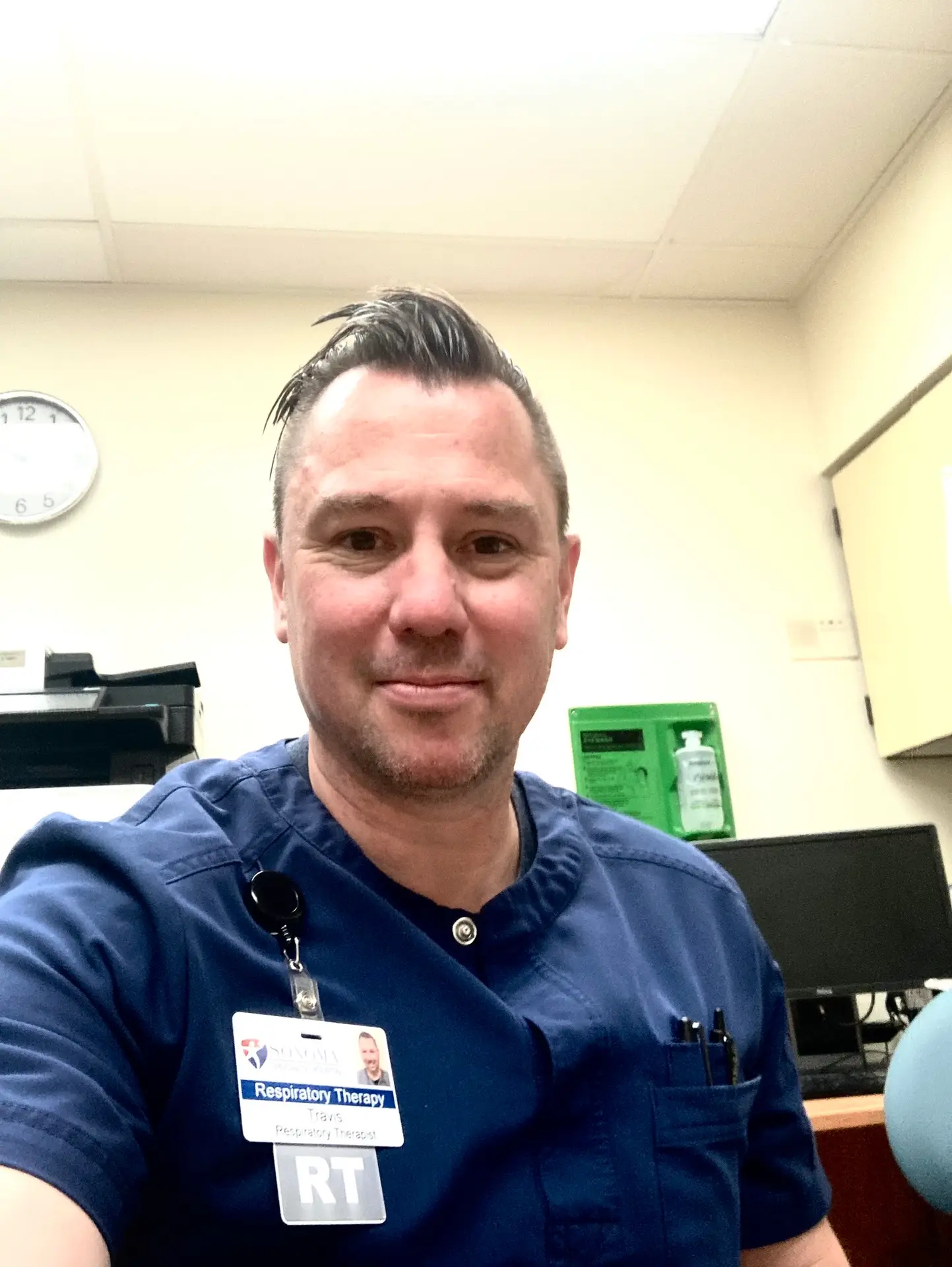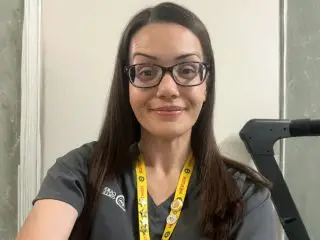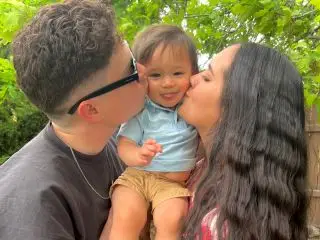 Travis Sleighter remembers all too well what it feels like to work hard and yet still struggle to pay his bills. Back in early 2020, he was working full time as a personal trainer at a Walnut Creek, California fitness club. But whenever the needs, commitment levels, or financial situations of his clients fluctuated, so did his income. “I was always in financial flux,” recalls Travis, who lives in Santa Rosa. “I was almost 40 years old, and I was struggling to pay my bills while I watched friends buying houses. It was frustrating and I was miserable. Something had to change.” That change came for Travis—and everyone else in the world—when the Covid pandemic put life on hold. “Like nearly everyone else, I was suddenly out of work,” says Travis, now 43. “I had lots of time on my hands to think. I used that break as an opportunity to really reflect on my life and to make some big decisions.” One of those decisions was to enroll in Carrington College’s Respiratory Care program. But for nearly a year before he began the program, he worked for his father’s construction company, helping to build a house from scratch. Travis saved money and paid his rent two years in advance so that he wouldn’t need to work full time while attending school. He began his program in May, 2021 and graduated in the spring of 2023. Today, he’s working as a Registered Respiratory Therapist at a Sebastopol hospital and says he not only loves his new career, but the financial stability it affords. We talked with Travis about how his medical challenges as a boy inspired an interest in respiratory care, what he loves most about his new career, and best advice he’d give anyone who’s thinking of following in his footsteps.
Travis Sleighter remembers all too well what it feels like to work hard and yet still struggle to pay his bills. Back in early 2020, he was working full time as a personal trainer at a Walnut Creek, California fitness club. But whenever the needs, commitment levels, or financial situations of his clients fluctuated, so did his income. “I was always in financial flux,” recalls Travis, who lives in Santa Rosa. “I was almost 40 years old, and I was struggling to pay my bills while I watched friends buying houses. It was frustrating and I was miserable. Something had to change.” That change came for Travis—and everyone else in the world—when the Covid pandemic put life on hold. “Like nearly everyone else, I was suddenly out of work,” says Travis, now 43. “I had lots of time on my hands to think. I used that break as an opportunity to really reflect on my life and to make some big decisions.” One of those decisions was to enroll in Carrington College’s Respiratory Care program. But for nearly a year before he began the program, he worked for his father’s construction company, helping to build a house from scratch. Travis saved money and paid his rent two years in advance so that he wouldn’t need to work full time while attending school. He began his program in May, 2021 and graduated in the spring of 2023. Today, he’s working as a Registered Respiratory Therapist at a Sebastopol hospital and says he not only loves his new career, but the financial stability it affords. We talked with Travis about how his medical challenges as a boy inspired an interest in respiratory care, what he loves most about his new career, and best advice he’d give anyone who’s thinking of following in his footsteps.
What first attracted you to the field of respiratory care?
I knew I wanted to work in health care. I had bad asthma as a kid and I was rushed to the emergency room a few times, so I knew firsthand what respiratory therapy can do for people. My experience also gave me a perspective as to what good, patient-centered care looks and feels like, so I started researching respiratory care programs and discovered Carrington College offered one. I think my own life experience as a kid with asthma makes me a better respiratory therapist because I know what feels like to struggle to breathe. I also know what it feels like to be overwhelmed by anxiety and fear. I learned how to manage it and to calm myself down. That’s a perspective and insight that I’m able to share with my patients.
How would you describe your job as a respiratory therapist to someone who knows nothing about the field?
I make sure patients are able to breathe. That can include everything from administering therapeutic treatments to putting people on mechanical ventilators to sucking mucus out of their lungs. One day I’m working with an infant whose lungs aren’t fully developed, the next I may be working with a patient who has advanced lung disease. The one thing my patients have in common is difficulty with breathing. I work at the direction of doctors to manage and reduce or eliminate that difficulty.
You’ve been in your new career for a year now. What do you like most about it?
I love helping people make progress and become healthier. I get a lot of satisfaction out of seeing people who were in rough shape when they arrived at the hospital walk out feeling better. I also like solving problems and figuring out new ways to make something work better, whether it’s fixing a piece of equipment or figuring out a system that can be more efficient.
How valuable were the clinicals you did during your program in providing you with a good overview of the career you were about to enter?
They were super important for me. I did four internships—at Kaiser in South Sacramento, Central Valley Specialty Hospital in Modesto, Sonoma Specialty Hospital in Sebastopol, and Dominican Hospital in Santa Cruz. I learned different things about my future career—and about myself—during each clinical.
No matter how comprehensive your classroom experience is, clinical experiences provide context and perspective. They give you a real taste of the day-to-day responsibilities and challenges you’re going to experience in the real world. You observe doctors, nurses, respiratory therapists, and other health care professionals interact with patients, sometimes in difficult or even heartbreaking situations. You see what it’s like to deal with people who have varying levels of consciousness and understanding. You develop a sense of who you do—and don’t—want to be when working with patients.
What has changed most in your life since you completed your Respiratory Care program at Carrington College?
Everything! I’m working in a field I enjoy, I’m banking a lot of money, and my girlfriend and I are taking vacations. None of that was possible before I started my program. One of the practical things I really love about my work is that I work five 12-hour shifts one week, and four 12-hour shifts the next week. I work hard and then have time off to play hard and travel.
What do you see for your future? What would you like to be doing ten years from now?
Ten years from now, I plan to be close to retirement. I’m working a lot of overtime hours and I’m saving and investing pretty aggressively to make up for lost time. Within 10 to 12 years, my goal is to be financially secure enough to stop working and travel even more than I do now. Five years ago, I never would have believed that could be an option for me, but the career path I’ve followed can make it possible.
What would you tell someone who was considering enrolling in Carrington College’s Respiratory Care program? Any tips or words of advice?
If it’s something you really want to do, commit and give it the focus, attention, and energy it deserves. I knew people who underestimated the commitment the program required, and they really struggled. I think some people believe that a two-year occupational program will be easier than a traditional four-year college degree. That wasn’t my experience. It’s a comprehensive program, it moves fast, and you’ve got to keep up. My instructors at Carrington College were really there for me. But at the end of the day, it was up to me to study and apply myself. I’m glad I did because my life is in a much better place today than it was just four years ago. So I guess what I’d tell someone who’s thinking about enrolling in the Respiratory Care program is that while it’s not always easy, it’s definitely worth it.



